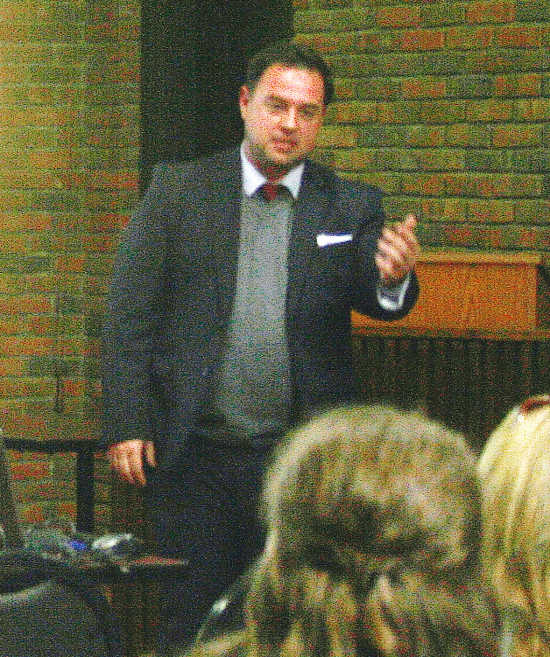State public access counselor discusses Open Door, APRA

Indiana Public Access Counselor Luke Britt delivered a presentation about Indiana public access laws Thursday evening in an event sponsored by the League of Women Voters and the Banner Graphic.
Britt’s main focus was on explaining the Access to Public Records Act (APRA) and the Open Door Law (ODL), but there were many questions from the audience, which mostly consisted of board members, city officials and genealogical researchers.
“There’s a very specific reason why this office is even in existence,” Britt said. “For the most part, the public gets the right to see what we do as civil servants. My job is to shift the perspective of public employees and public officials from being territorial and say, ‘We’re just being stewards of this information that really belongs to the public at-large.’ It’s not just an option; it’s an affirmative duty.”
But Britt went on to caution that the Office of Indiana Public Access does not have enforcement authority.
“We can’t force anybody to do anything,” Britt said. “If a local government is withholding a document it shouldn’t, I can’t compel them to give that out. What I can do, though, is encourage them and make recommendations that they follow the law and have their policy reflect best practices.”
Aside from mediating public access disputes, a big part of that function is to publish legal opinions online at in.gov/pac.
“That can be a first step, a helpful tool to know,” Britt said, “if you’re a public official, what your responsibilities are and, if you’re part of the public, what your rights are when it comes to public access.”
Britt also said that the number of complaints has risen “exponentially” in the past few years, “it’s almost increased fourfold in the last five years or so.”
During the 2014-15 fiscal year, inquiries totaled 4,245, formal complaints 317 and informal inquiries (legal research) 24.
“More and more people are becoming interested in what their government is doing,” Britt said, “not only with their tax money, but also what they’re doing with their information and how they’re being stewards of the resources that are entrusted to them as representatives.”
The APRA was passed in 1983 at the behest of newspapers and includes Indiana Code 5-14-3-1 through 5-14-3-10. Among other things, it states the amount of time in which a governing body must acknowledge an APRA request and that it must respond to the request in a “reasonable time.” It also sets copy fees and the need for requests to be specific.
The ODL includes I.C. 5-14-1.5-1, and mainly concerns how public, special and executive meetings must be conducted. The law states that if a majority of a governing body meets to take official action (discussing, deliberating, receiving and giving information), the meeting must be open to the public with 48 hours notice.
The exceptions are special meetings of county executives and executive meetings, but these can only be legitimate if they meet strict criteria and the governing body is not allowed to take final action.
In answer to an audience question, Britt said that executive sessions should be used sparingly, but that there can be legitimate reasons to have an executive session every month.
In answer to another audience question, Britt said that a board member may ask other member’s opinions via email, but they must not vote in any other forum but a public meeting.
For more information or to see the PowerPoint presentation, visit in.gov/pac. For public access questions, citizens can contact Britt toll-free at 1-800-228-6013.
“I really appreciate your attention and your questions,” Britt said. “I extend the invitation that if any of you have further questions or need clarification, reach out to my office, get a hold of me and we can chew on whatever issues you’re facing as far as public access.”
